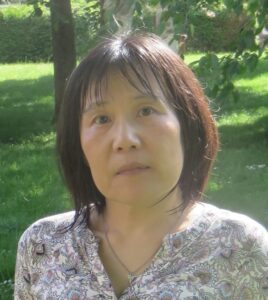 Kaori Nagai is a Senior Lecturer in Victorian Literature at the University of Kent and the principal investigator of ‘RethinkingFables in the Age of Global Environmental Crisis.’ She works in the field of animal studies, with a particular interest in nineteenth-century colonial contexts and maritime history. She is the author of Imperial Beast Fables: Animals, Cosmopolitanism, and the British Empire (Palgrave 2020) and the editor of two animal studies collections: Cosmopolitan Animals (chief editor; Palgrave MacMillan, 2015) and Maritime Animals (2023; Pennsylvania State University Press, Animalibus series). Kaori is a founding member and coordinator of the Kent Animal Humanities Network. E-mail: K.Nagai@kent.ac.uk.
Kaori Nagai is a Senior Lecturer in Victorian Literature at the University of Kent and the principal investigator of ‘RethinkingFables in the Age of Global Environmental Crisis.’ She works in the field of animal studies, with a particular interest in nineteenth-century colonial contexts and maritime history. She is the author of Imperial Beast Fables: Animals, Cosmopolitanism, and the British Empire (Palgrave 2020) and the editor of two animal studies collections: Cosmopolitan Animals (chief editor; Palgrave MacMillan, 2015) and Maritime Animals (2023; Pennsylvania State University Press, Animalibus series). Kaori is a founding member and coordinator of the Kent Animal Humanities Network. E-mail: K.Nagai@kent.ac.uk.
 Ali Abdullatif Ahmida is a professor and founding chair of the Department of Political Science, College of Arts and Sciences, at the University of New England, USA. His scholarship focuses on power, agency, and anti-colonial resistance in North Africa, especially modern Libya. He has written and edited numerous books, which include The Making of Modern Libya: State Formation, Colonialization and Resistance (SUNY Press, 1994), Beyond Colonialism and Nationalism in the Maghrib (editor; Palgrave, 2000), Forgotten Voices: Power and Agency in Colonial and Postcolonial Libya (Palgrave 2005), Bridges Across the Sahara (Cambridge Scholars Press, 2009). His latest book Genocide in Libya: Shar, A Hidden Colonial History (Routledge, 2020) is based on the survivors’ oral history of the forgotten genocide in colonial Libya, and won the Carl Brown 2022 book Award of the American Institute of Maghrib Studies.
Ali Abdullatif Ahmida is a professor and founding chair of the Department of Political Science, College of Arts and Sciences, at the University of New England, USA. His scholarship focuses on power, agency, and anti-colonial resistance in North Africa, especially modern Libya. He has written and edited numerous books, which include The Making of Modern Libya: State Formation, Colonialization and Resistance (SUNY Press, 1994), Beyond Colonialism and Nationalism in the Maghrib (editor; Palgrave, 2000), Forgotten Voices: Power and Agency in Colonial and Postcolonial Libya (Palgrave 2005), Bridges Across the Sahara (Cambridge Scholars Press, 2009). His latest book Genocide in Libya: Shar, A Hidden Colonial History (Routledge, 2020) is based on the survivors’ oral history of the forgotten genocide in colonial Libya, and won the Carl Brown 2022 book Award of the American Institute of Maghrib Studies.
 Christiane M. Bongartz: With a doctorate in English Language and Linguistics (UW Madison) I have embarked on a career that investigates language in terms of the mind and in terms of embodiment. As a professor of English linguistics in Cologne I am involved in international projects on literacy and language. Locally, my team members and I investigate multilingualism with respect to language development, participation, and socio-economic conditioning. I am a strong advocate of ‘compassionate linguistics’: for me, this involves efforts to move away from linguistics as a means to categorize (standard vs. non-standard, grammatical vs. non-grammatical, monolingual vs. bilingual) towards making use of linguistics to support a heterogeneous and inclusive society. Recently, these efforts have expanded to take a view of communication and interaction that might overcome species-ism; in particular, I am interested in using linguistic tools to account for horse-human relationships and the mutual ‘reading’ this involves.
Christiane M. Bongartz: With a doctorate in English Language and Linguistics (UW Madison) I have embarked on a career that investigates language in terms of the mind and in terms of embodiment. As a professor of English linguistics in Cologne I am involved in international projects on literacy and language. Locally, my team members and I investigate multilingualism with respect to language development, participation, and socio-economic conditioning. I am a strong advocate of ‘compassionate linguistics’: for me, this involves efforts to move away from linguistics as a means to categorize (standard vs. non-standard, grammatical vs. non-grammatical, monolingual vs. bilingual) towards making use of linguistics to support a heterogeneous and inclusive society. Recently, these efforts have expanded to take a view of communication and interaction that might overcome species-ism; in particular, I am interested in using linguistic tools to account for horse-human relationships and the mutual ‘reading’ this involves.
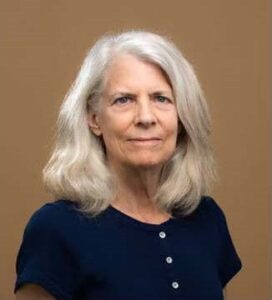 Laura Brown (Ph.D., Univ. of California, Berkeley) is the John Wendell Anderson Professor in the Department of Literatures in English at Cornell University. She has published widely in eighteenth-century studies, and has served as President of the American Society for Eighteenth-Century Studies and as Vice Provost for Undergraduate Education at Cornell University. She studies gender, slavery, and imperialism, the portrayal of animals, and the counterhuman force of “things,” storms, and earthquakes in eighteenth-century literature. Her most recent book — The Counterhuman Imaginary: Earthquakes, Lapdogs, and Traveling Coinage in Eighteenth-Century English Literature — extends her ongoing work in posthuman theory and critique.
Laura Brown (Ph.D., Univ. of California, Berkeley) is the John Wendell Anderson Professor in the Department of Literatures in English at Cornell University. She has published widely in eighteenth-century studies, and has served as President of the American Society for Eighteenth-Century Studies and as Vice Provost for Undergraduate Education at Cornell University. She studies gender, slavery, and imperialism, the portrayal of animals, and the counterhuman force of “things,” storms, and earthquakes in eighteenth-century literature. Her most recent book — The Counterhuman Imaginary: Earthquakes, Lapdogs, and Traveling Coinage in Eighteenth-Century English Literature — extends her ongoing work in posthuman theory and critique.
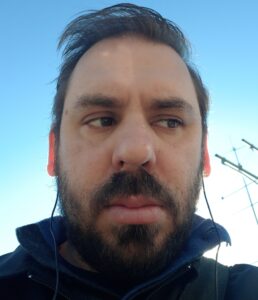 Matthew Chrulew (@negentropist) is a writer and researcher from Boorloo/Perth. His fiction has appeared in Westerly, Cosmos, Plutonics and Ecopunk! and his essays in Island, New Literary History, Trends in Ecology & Evolution and Biosemiotics. In 2022, he edited the volume Kin: Thinking With Deborah Bird Rose (Duke) with Thom van Dooren, the speculative fiction anthology Phase Change: Imagining Energy Futures (Twelfth Planet), and his short story collection Future Perfect, and Other Worldly Tenses was longlisted in the Hungerford Award. He was founding associate editor of Environmental Humanities journal, has edited special issues of SubStance, Angelaki, Parallax and Relegere, and edits the book series Animalities at Edinburgh University Press. He is Senior Research Fellow and leads the Posthumanities, Animalities, Environments research stream in the Centre for Culture and Technology at Curtin University.
Matthew Chrulew (@negentropist) is a writer and researcher from Boorloo/Perth. His fiction has appeared in Westerly, Cosmos, Plutonics and Ecopunk! and his essays in Island, New Literary History, Trends in Ecology & Evolution and Biosemiotics. In 2022, he edited the volume Kin: Thinking With Deborah Bird Rose (Duke) with Thom van Dooren, the speculative fiction anthology Phase Change: Imagining Energy Futures (Twelfth Planet), and his short story collection Future Perfect, and Other Worldly Tenses was longlisted in the Hungerford Award. He was founding associate editor of Environmental Humanities journal, has edited special issues of SubStance, Angelaki, Parallax and Relegere, and edits the book series Animalities at Edinburgh University Press. He is Senior Research Fellow and leads the Posthumanities, Animalities, Environments research stream in the Centre for Culture and Technology at Curtin University.
 Chris Danta is professor of English in the School of Cybernetics at the ANU. He is currently working on an ARC Future Fellowship with the title Future Fables: Literature, Evolution and Artificial Intelligence (2021-24). His research operates at the intersection of literary theory, philosophy, science and theology. He is the author of Literature Suspends Death: Sacrifice and Storytelling in Kierkegaard, Kafka and Blanchot (Bloomsbury, 2011) and Animal Fables after Darwin: Literature, Speciesism, and Metaphor (Cambridge University Press, 2018).
Chris Danta is professor of English in the School of Cybernetics at the ANU. He is currently working on an ARC Future Fellowship with the title Future Fables: Literature, Evolution and Artificial Intelligence (2021-24). His research operates at the intersection of literary theory, philosophy, science and theology. He is the author of Literature Suspends Death: Sacrifice and Storytelling in Kierkegaard, Kafka and Blanchot (Bloomsbury, 2011) and Animal Fables after Darwin: Literature, Speciesism, and Metaphor (Cambridge University Press, 2018).
 Jeanne Dubino is a professor of English, Global Studies, and Animal Studies at Appalachian State University, North Carolina, USA. She has been a visiting assistant professor of literature and Women’s Studies at Bilkent University, Turkey; a Fulbright Scholar/Researcher at Egerton University, Kenya; Fulbright Specialist at Northeastern University, China; and visiting scholar at Ain Shams University, Egypt. This summer she will be a Fulbright Specialist at the Federal University of Paraíba, Brazil. Her publications include collections, essays, articles, and reviews on Animal Studies, travel, gender, and Virginia Woolf. She is currently working on a monograph on stray/street/free-ranging dogs in literature.
Jeanne Dubino is a professor of English, Global Studies, and Animal Studies at Appalachian State University, North Carolina, USA. She has been a visiting assistant professor of literature and Women’s Studies at Bilkent University, Turkey; a Fulbright Scholar/Researcher at Egerton University, Kenya; Fulbright Specialist at Northeastern University, China; and visiting scholar at Ain Shams University, Egypt. This summer she will be a Fulbright Specialist at the Federal University of Paraíba, Brazil. Her publications include collections, essays, articles, and reviews on Animal Studies, travel, gender, and Virginia Woolf. She is currently working on a monograph on stray/street/free-ranging dogs in literature.
 Erica Fudge is professor of English Studies at the University of Strathclyde in Glasgow, Scotland, and the director of the British Animal Studies Network (BASN). She has published work in Angelaki, New Formations, History and Theory, among others, and her most recent book is Quick Cattle and Dying Wishes: People and Their Animals in Early Modern England (Cornell UP, 2018).
Erica Fudge is professor of English Studies at the University of Strathclyde in Glasgow, Scotland, and the director of the British Animal Studies Network (BASN). She has published work in Angelaki, New Formations, History and Theory, among others, and her most recent book is Quick Cattle and Dying Wishes: People and Their Animals in Early Modern England (Cornell UP, 2018).
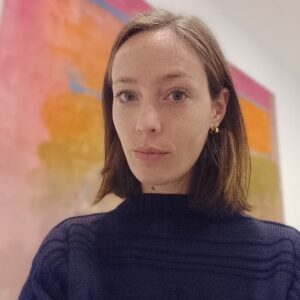 Isabel Galleymore is an Associate Professor in Creative Writing at the University of Birmingham. She is the author of Significant Other (Carcanet 2019) and Teaching Environmental Writing: Ecocritical Pedagogy and Poetics (Bloomsbury Academic 2020). Isabel held the position of Walter Jackson Bate Fellow at Harvard University’s Radcliffe Institute for Advanced Study, 2022-23. Her AHRC Research, Development and Engagement Fellowship project is Cuteness in Contemporary Environmental Culture. She co-runs AWW-STRUCK, a research group that hosts events on creative and critical approaches to cute studies.
Isabel Galleymore is an Associate Professor in Creative Writing at the University of Birmingham. She is the author of Significant Other (Carcanet 2019) and Teaching Environmental Writing: Ecocritical Pedagogy and Poetics (Bloomsbury Academic 2020). Isabel held the position of Walter Jackson Bate Fellow at Harvard University’s Radcliffe Institute for Advanced Study, 2022-23. Her AHRC Research, Development and Engagement Fellowship project is Cuteness in Contemporary Environmental Culture. She co-runs AWW-STRUCK, a research group that hosts events on creative and critical approaches to cute studies.
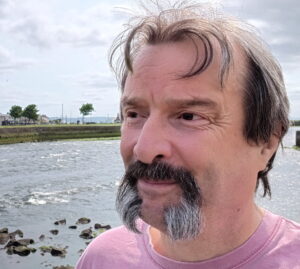 John Hartigan is a Professor, Department of Anthropology and the Director of the Américo Paredes Center for Cultural Studies at the University of Texas, Austin. His most recent books include Shaving the Beasts: Wild Horses and Ritual in Spain, Care of the Species: Races of Corn and the Science of Plant Biodiversity and Aesop’s Anthropology: A Multispecies Approach (all from the University of Minnestoa Press).
John Hartigan is a Professor, Department of Anthropology and the Director of the Américo Paredes Center for Cultural Studies at the University of Texas, Austin. His most recent books include Shaving the Beasts: Wild Horses and Ritual in Spain, Care of the Species: Races of Corn and the Science of Plant Biodiversity and Aesop’s Anthropology: A Multispecies Approach (all from the University of Minnestoa Press).
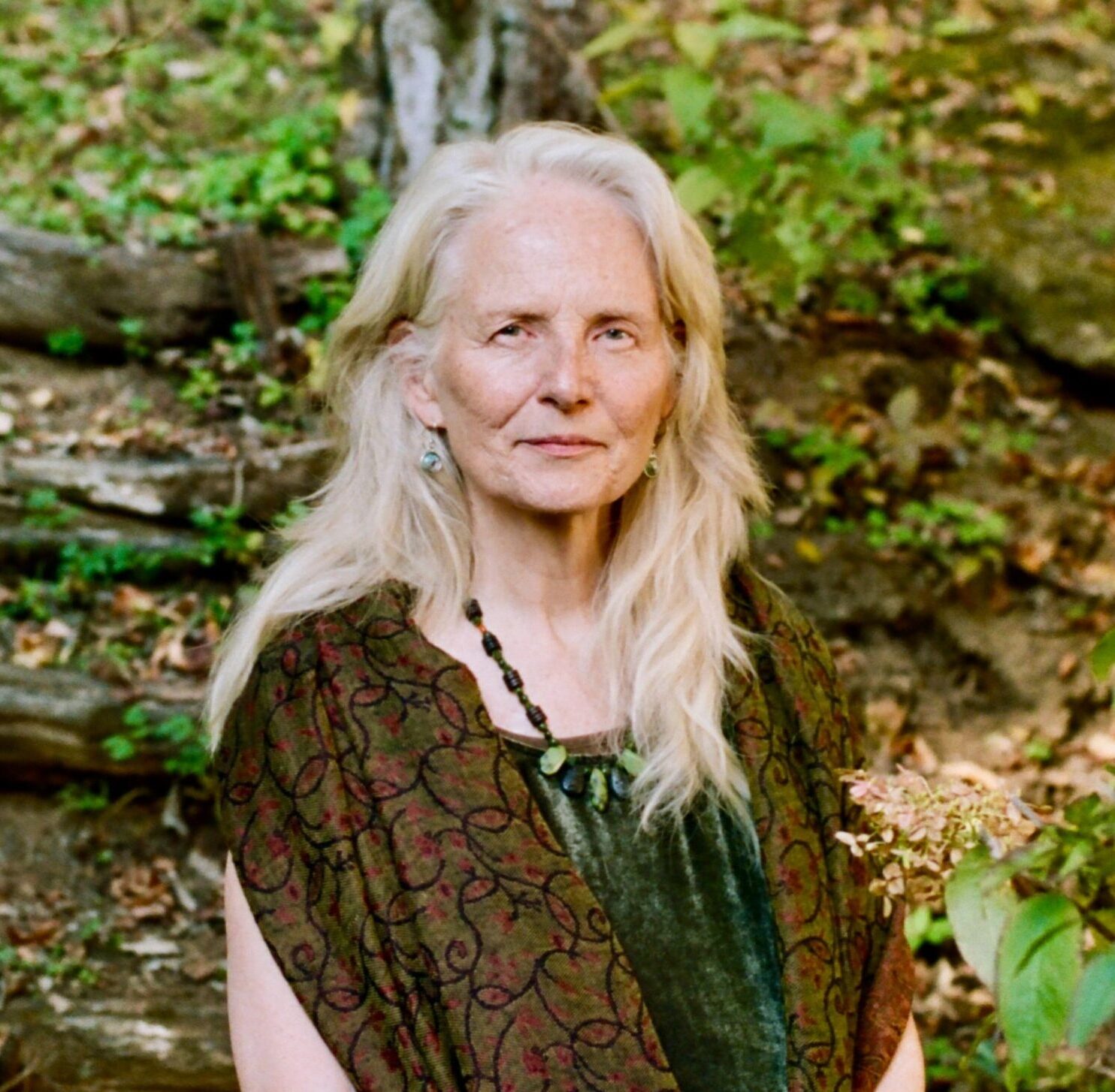 Kathryn Kirkpatrick is Professor of English at Appalachian State University where she teaches environmental literature, animal studies, and Irish studies from an ecofeminist perspective and where she co-directs the animal studies minor, a multidisciplinary program she helped to found. Kirkpatrick has published essays on class trauma, eco-feminist poetics, and animal studies, focusing particularly on the work of Dublin poet Paula Meehan. Her monograph on Meehan’s work, Enraptured Space, is from West Virginia University Press (2025). She is co-editor of Animals in Irish Literature and Culture (2015). As well as a scholar and editor, Kirkpatrick is the author of eight collections of poetry, including three recipients of the NC Poetry Society’s Brockman-Campbell award, The Body’s Horizon (1996), Our Held Animal Breath (2012), and Her Small Hands Were Not Beautiful (2014). The Fisher Queen: New & Selected Poems (Salmon, 2019) received the NC Literary and Historical Society’s Roanoke Chowan Poetry Prize. Creature was published by Jacar Press in 2025.
Kathryn Kirkpatrick is Professor of English at Appalachian State University where she teaches environmental literature, animal studies, and Irish studies from an ecofeminist perspective and where she co-directs the animal studies minor, a multidisciplinary program she helped to found. Kirkpatrick has published essays on class trauma, eco-feminist poetics, and animal studies, focusing particularly on the work of Dublin poet Paula Meehan. Her monograph on Meehan’s work, Enraptured Space, is from West Virginia University Press (2025). She is co-editor of Animals in Irish Literature and Culture (2015). As well as a scholar and editor, Kirkpatrick is the author of eight collections of poetry, including three recipients of the NC Poetry Society’s Brockman-Campbell award, The Body’s Horizon (1996), Our Held Animal Breath (2012), and Her Small Hands Were Not Beautiful (2014). The Fisher Queen: New & Selected Poems (Salmon, 2019) received the NC Literary and Historical Society’s Roanoke Chowan Poetry Prize. Creature was published by Jacar Press in 2025.
 Donna Landry (Ph.D., University of Virginia) is Professor of English and American Literature, Emeritus, at the University of Kent, and a Fellow of the Royal Asiatic Society. She has published widely on horse-human relationships in history, travel, Anglo-Ottoman and East-West relations, historical reenactment as a mode and practice of research, gender, queerness, imperialism, slavery, race, colonialism, Orientalism, and the politics and aesthetics of the countryside. She investigates historically and cross-culturally, and whenever possible with a multidisciplinary lens. Her book Noble Brutes explored how blood horses imported from the Ottoman Empire revolutionised British equestrian culture, inspiring Book 4 of Gulliver’s Travels and George Stubbs’s sporting art. Donna’s current projects include a monograph on the battle of Waterloo from the perspective of the horses, and a co-authored book, with Gerald MacLean, on exploration, natural history, and Ottoman culture, following the Ottoman explorer and ‘long rider’ Evliya Çelebi (1611-c.1687). With Ercihan Dilari, Caroline Finkel, and Gerald MacLean, Donna was a founding member of the Evliya Çelebi Ride and Way, a project of historical re-enactment, leading to the establishment of an UNESCO cultural route, The Evliya Çelebi Way. Her participation was supported by the Leverhulme Trust.
Donna Landry (Ph.D., University of Virginia) is Professor of English and American Literature, Emeritus, at the University of Kent, and a Fellow of the Royal Asiatic Society. She has published widely on horse-human relationships in history, travel, Anglo-Ottoman and East-West relations, historical reenactment as a mode and practice of research, gender, queerness, imperialism, slavery, race, colonialism, Orientalism, and the politics and aesthetics of the countryside. She investigates historically and cross-culturally, and whenever possible with a multidisciplinary lens. Her book Noble Brutes explored how blood horses imported from the Ottoman Empire revolutionised British equestrian culture, inspiring Book 4 of Gulliver’s Travels and George Stubbs’s sporting art. Donna’s current projects include a monograph on the battle of Waterloo from the perspective of the horses, and a co-authored book, with Gerald MacLean, on exploration, natural history, and Ottoman culture, following the Ottoman explorer and ‘long rider’ Evliya Çelebi (1611-c.1687). With Ercihan Dilari, Caroline Finkel, and Gerald MacLean, Donna was a founding member of the Evliya Çelebi Ride and Way, a project of historical re-enactment, leading to the establishment of an UNESCO cultural route, The Evliya Çelebi Way. Her participation was supported by the Leverhulme Trust.
 Christoph Lange is the Academic Programme Manager of MESH. He studied Social Anthropology and Middle East Studies. His research interests lie regionally in the Southern Mediterranean & Arab Middle East and theoretically he is interested in more-than-human anthropology, science and technology studies (STS), and the global history of sociotechnical entanglements. After finishing his PhD on the Making and Remaking of the Arabian Horse, he is currently developing a postdoctoral research on the eco-humanitarian interventions in the Mediterranean from a Critical Zone’s perspective.
Christoph Lange is the Academic Programme Manager of MESH. He studied Social Anthropology and Middle East Studies. His research interests lie regionally in the Southern Mediterranean & Arab Middle East and theoretically he is interested in more-than-human anthropology, science and technology studies (STS), and the global history of sociotechnical entanglements. After finishing his PhD on the Making and Remaking of the Arabian Horse, he is currently developing a postdoctoral research on the eco-humanitarian interventions in the Mediterranean from a Critical Zone’s perspective.
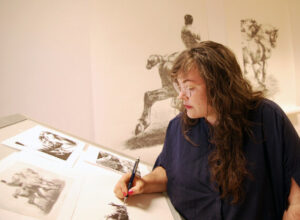 EvaMarie Lindahl, PhD, is a visual artist and researcher based in Sweden. Her research-driven art projects are situated in the intersection of Critical Animal Studies, the visual arts and activism. Lindahl has developed an art practice that encompass large-scale graphite drawings as well as text-based performance work. Through her projects, Lindahl is questioning the anthropocentric and patriarchal tradition of writing art history by correcting, re-writing and imagining new (art) histories. In her current work, she is questioning the human-animal dichotomy and addressing the human habit of oppressing other animals by using them as resource and material in art production.
EvaMarie Lindahl, PhD, is a visual artist and researcher based in Sweden. Her research-driven art projects are situated in the intersection of Critical Animal Studies, the visual arts and activism. Lindahl has developed an art practice that encompass large-scale graphite drawings as well as text-based performance work. Through her projects, Lindahl is questioning the anthropocentric and patriarchal tradition of writing art history by correcting, re-writing and imagining new (art) histories. In her current work, she is questioning the human-animal dichotomy and addressing the human habit of oppressing other animals by using them as resource and material in art production.
 Garry Marvin is a social anthropologist and Professor of Human-Animal Studies at the University of Roehampton, London. He is particularly interested in how human-animal relationships are developed and how they are experienced by the human participants. He has conducted ethnographic research into, and published on, bullfighting in Spain; zoos; foxhunting in England; the cultures of recreational hunting; hunting and conservation; human-wolf relationships. A key focus of his work is the local specificities of human-animal relationships. However, he is also interested in cross-cultural and inter-cultural perspectives. These have been developed in the Routledge Handbook of Human-Animal Studies, with Susan McHugh, (University of New England), 2014, a 4-volume Human-Animal Studies: Global Perspectives, with Susan McHugh (2017) and a new book series Multi-Species Anthropology: New Ethnographies of which he is an editor with Rebecca Cassidy (Goldsmiths College, University of London).
Garry Marvin is a social anthropologist and Professor of Human-Animal Studies at the University of Roehampton, London. He is particularly interested in how human-animal relationships are developed and how they are experienced by the human participants. He has conducted ethnographic research into, and published on, bullfighting in Spain; zoos; foxhunting in England; the cultures of recreational hunting; hunting and conservation; human-wolf relationships. A key focus of his work is the local specificities of human-animal relationships. However, he is also interested in cross-cultural and inter-cultural perspectives. These have been developed in the Routledge Handbook of Human-Animal Studies, with Susan McHugh, (University of New England), 2014, a 4-volume Human-Animal Studies: Global Perspectives, with Susan McHugh (2017) and a new book series Multi-Species Anthropology: New Ethnographies of which he is an editor with Rebecca Cassidy (Goldsmiths College, University of London).
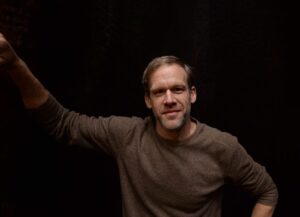 Tobias Menely is Professor of English at the University of California, Davis. He is the author of The Animal Claim: Sensibility and the Creaturely Voice (Chicago 2015) and Climate and the Making of Worlds: Toward a Geohistorical Poetics (Chicago 2021). With Jesse Oak Taylor, he co-edited Anthropocene Reading: Literary History in Geologic Times (Penn State, 2017). He is currently writing a book about megafauna conservation in the Anthropocene.
Tobias Menely is Professor of English at the University of California, Davis. He is the author of The Animal Claim: Sensibility and the Creaturely Voice (Chicago 2015) and Climate and the Making of Worlds: Toward a Geohistorical Poetics (Chicago 2021). With Jesse Oak Taylor, he co-edited Anthropocene Reading: Literary History in Geologic Times (Penn State, 2017). He is currently writing a book about megafauna conservation in the Anthropocene.
 Robert McKay is Professor of Contemporary Literature at the University of Sheffield, where he is co-director of the Sheffield Animal Studies Research Centre. He has published widely on the politics of species in modern and contemporary literature and film, including the co-edited volumes Animal Satire (Palgrave, 2023), Animal Remains (Routledge, 2022), The Palgrave Handbook of Animals and Literature (Palgrave, 2021), and Werewolves, Wolves and the Gothic (University of Wales Press, 2017). He is series co-editor for Palgrave Studies in Animals and Literature and Humanities Managing Editor for Society & Animals.
Robert McKay is Professor of Contemporary Literature at the University of Sheffield, where he is co-director of the Sheffield Animal Studies Research Centre. He has published widely on the politics of species in modern and contemporary literature and film, including the co-edited volumes Animal Satire (Palgrave, 2023), Animal Remains (Routledge, 2022), The Palgrave Handbook of Animals and Literature (Palgrave, 2021), and Werewolves, Wolves and the Gothic (University of Wales Press, 2017). He is series co-editor for Palgrave Studies in Animals and Literature and Humanities Managing Editor for Society & Animals.
Stuart McLean is Professor of Anthropology and Global Studies at the University of Minnesota. He has carried out ethnographic fieldwork in Ireland and the Orkney Islands. His work proceeds from the assumption that that the social and cultural worlds humans often pride themselves on creating are not and have never been exclusively human but are dependent upon and inflected by a multitude of other than human potencies and presences – animals, plants, geological formations, weather systems, and a range of humanly manufactured artifacts fashioned from a variety of materials. In seeking ways to acknowledge and respond to such presences, his work attempts to learn both from anthropology’s encounters with non-Western traditions of thought, in which distinctions between humans and other kinds of beings may be configured in radically different ways, and from art and literature as engagements with the materiality of media (paint, stone, celluloid, the body of the performer, the rhythmic and phonic ‘substance’ of language) that always have the capacity to exceed or disrupt the human projects enacted through them. To this end his work has also sought self-consciously to blur distinctions not only between academic and creative writing (including poetry) but also between writing and other expressive genres (audio-visual and performative).
 Brett Mills is Professor of Media at Edge Hill University, UK, and Honorary Professor of Media and Culture at the University of East Anglia, UK. He is the author of Animals on Television: The Cultural Making of the Non-Human (2017). He was a member of the team for the AHRC-funded research projects, ‘Multispecies Storytelling: More-Than-Human Narratives About Landscape’ (2019-22) and ‘Multisensory Multispecies Storytelling to Engage Disadvantaged Groups in Changing Landscapes’ (2020-22). He is member of the Centre for Human-Animal Studies at Edge Hill University, and of the Culivian: Culturas Literarias y Visuales del Animal Research Group at the University of Valencia, Spain.
Brett Mills is Professor of Media at Edge Hill University, UK, and Honorary Professor of Media and Culture at the University of East Anglia, UK. He is the author of Animals on Television: The Cultural Making of the Non-Human (2017). He was a member of the team for the AHRC-funded research projects, ‘Multispecies Storytelling: More-Than-Human Narratives About Landscape’ (2019-22) and ‘Multisensory Multispecies Storytelling to Engage Disadvantaged Groups in Changing Landscapes’ (2020-22). He is member of the Centre for Human-Animal Studies at Edge Hill University, and of the Culivian: Culturas Literarias y Visuales del Animal Research Group at the University of Valencia, Spain.
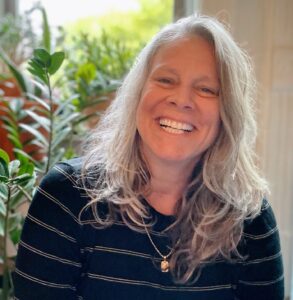 Lisa Jean Moore is a medical sociologist and SUNY Distinguished Professor of Sociology and Gender Studies at Purchase College, SUNY. Her books include an ethnography of honeybees, Buzz: Urban Beekeeping and the Power of the Bee (NYUP) co-authored with Mary Kosut. Catch and Release: The Enduring, yet Vulnerable, Horseshoe Crab (NYUP) examines the interspecies relationships between humans and Limulus polyphemus (Atlantic Horseshoe Crabs). Our Transgenic Future: Spider Goats, Genetic Modification and the Will to Change Nature (NYUP) investigates the creation of spider goats, a genetically modified species that lactates spider silk protein. She lives in Brooklyn, NY with her family.
Lisa Jean Moore is a medical sociologist and SUNY Distinguished Professor of Sociology and Gender Studies at Purchase College, SUNY. Her books include an ethnography of honeybees, Buzz: Urban Beekeeping and the Power of the Bee (NYUP) co-authored with Mary Kosut. Catch and Release: The Enduring, yet Vulnerable, Horseshoe Crab (NYUP) examines the interspecies relationships between humans and Limulus polyphemus (Atlantic Horseshoe Crabs). Our Transgenic Future: Spider Goats, Genetic Modification and the Will to Change Nature (NYUP) investigates the creation of spider goats, a genetically modified species that lactates spider silk protein. She lives in Brooklyn, NY with her family.
 Susan Richardson is a writer, performer and educator. Her latest book, Where the Seals Sing (William Collins, 2022), is a work of creative nonfiction focusing on the Atlantic grey seal, blending natural history and travel, memoir and myth. Susan is also a poet: her fourth and most recent collection, Words the Turtle Taught Me, themed around endangered ocean species, emerged from her residency with the Marine Conservation Society and was shortlisted for the Ted Hughes Award. She is currently writer-in-residence with both the global animal welfare initiative, World Animal Day, and the British Animal Studies Network.
Susan Richardson is a writer, performer and educator. Her latest book, Where the Seals Sing (William Collins, 2022), is a work of creative nonfiction focusing on the Atlantic grey seal, blending natural history and travel, memoir and myth. Susan is also a poet: her fourth and most recent collection, Words the Turtle Taught Me, themed around endangered ocean species, emerged from her residency with the Marine Conservation Society and was shortlisted for the Ted Hughes Award. She is currently writer-in-residence with both the global animal welfare initiative, World Animal Day, and the British Animal Studies Network.
 Thom van Dooren, FAHA, is Deputy Director at the Sydney Environment Institute and an Associate Professor in the School of Humanities at the University of Sydney. His research and writing focus on some of the many philosophical, ethical, cultural, and political issues that arise in the context of species extinctions and human entanglements with threatened species and places. He is the author of Flight Ways: Life and Loss at the Edge of Extinction (Columbia UP 2014), The Wake of Crows: Living and Dying in Shared Worlds (Columbia UP 2019), and A World in a Shell: Snail Stories for a Time of Extinctions (MIT 2022). Van Dooren was founding co-editor of the journal Environmental Humanities (Duke University Press) and is co-Director of the Oceania Observatory of the Humanities for the Environment initiative. From 2020-2022 he was a Professor II in the Oslo School of Environmental Humanities at the University of Oslo, from 2017-2021 he was an Australian Research Council Future Fellow at the University of Sydney, and from 2014-2016 he was a Humboldt Research Fellow at the Rachel Carson Center at LMU Munich (2014-16). He has held other visiting positions at the University of California at Santa Cruz, USA (2005, 2010) the KTH Environmental Humanities Laboratory in Stockholm (2014), the Department of Anthropology at MIT (2018), and the Centre for Pacific Islands Studies at the University of Hawai`i at Mānoa (2018).
Thom van Dooren, FAHA, is Deputy Director at the Sydney Environment Institute and an Associate Professor in the School of Humanities at the University of Sydney. His research and writing focus on some of the many philosophical, ethical, cultural, and political issues that arise in the context of species extinctions and human entanglements with threatened species and places. He is the author of Flight Ways: Life and Loss at the Edge of Extinction (Columbia UP 2014), The Wake of Crows: Living and Dying in Shared Worlds (Columbia UP 2019), and A World in a Shell: Snail Stories for a Time of Extinctions (MIT 2022). Van Dooren was founding co-editor of the journal Environmental Humanities (Duke University Press) and is co-Director of the Oceania Observatory of the Humanities for the Environment initiative. From 2020-2022 he was a Professor II in the Oslo School of Environmental Humanities at the University of Oslo, from 2017-2021 he was an Australian Research Council Future Fellow at the University of Sydney, and from 2014-2016 he was a Humboldt Research Fellow at the Rachel Carson Center at LMU Munich (2014-16). He has held other visiting positions at the University of California at Santa Cruz, USA (2005, 2010) the KTH Environmental Humanities Laboratory in Stockholm (2014), the Department of Anthropology at MIT (2018), and the Centre for Pacific Islands Studies at the University of Hawai`i at Mānoa (2018).
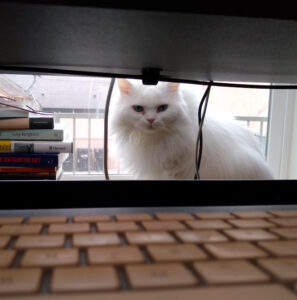 Sherryl Vint is Professor of Media and Cultural Studies and Chair of the Department of English at the University of California, Riverside, where she directs the Speculative Fictions and Cultures of Science program. She has published widely on science fiction, including, most recently, Biopolitical Futures in Twenty-First Century Speculative Fiction(2021) and Programming the Future: Speculative Television and the End of Democracy (2022, co-authored with Jonathan Alexander). She has published several essays on the intersections of animal studies and sf, and the book Animal Alterity (2008) on this topic. She was a founding editor of Science Fiction Film and Television and is an editor for the journal Science Fiction Studies and the book series Science in Popular Culture.
Sherryl Vint is Professor of Media and Cultural Studies and Chair of the Department of English at the University of California, Riverside, where she directs the Speculative Fictions and Cultures of Science program. She has published widely on science fiction, including, most recently, Biopolitical Futures in Twenty-First Century Speculative Fiction(2021) and Programming the Future: Speculative Television and the End of Democracy (2022, co-authored with Jonathan Alexander). She has published several essays on the intersections of animal studies and sf, and the book Animal Alterity (2008) on this topic. She was a founding editor of Science Fiction Film and Television and is an editor for the journal Science Fiction Studies and the book series Science in Popular Culture.
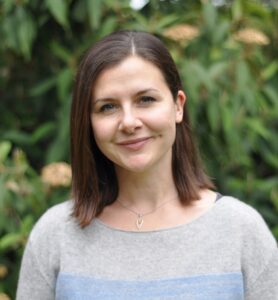 Jo Wimpenny is a zoologist and science writer based in Oxford, UK, with a research background in crow cognition and the history of science. Her DPhil investigated cognition in tool-using New Caledonian crows, and she then conducted postdoctoral research on the history of ornithology, co-authoring the award-winning Ten Thousand Birds: Ornithology Since Darwin (Princeton U. Press, 2014) with Tim Birkhead and Bob Montgomerie. Her book, Aesop’s Animals: The Facts Behind the Fables (Bloomsbury Sigma, 2021), critically appraised the characterisation of some of Aesop’s best-known animal characters, asking how they match up against the latest scientific research. For her current project (to be published by Bloomsbury Wildlife), she is delving deeper into the origins and nature of human-animal relationships, focusing on beasts in our cultures that are typically villainised or misunderstood.
Jo Wimpenny is a zoologist and science writer based in Oxford, UK, with a research background in crow cognition and the history of science. Her DPhil investigated cognition in tool-using New Caledonian crows, and she then conducted postdoctoral research on the history of ornithology, co-authoring the award-winning Ten Thousand Birds: Ornithology Since Darwin (Princeton U. Press, 2014) with Tim Birkhead and Bob Montgomerie. Her book, Aesop’s Animals: The Facts Behind the Fables (Bloomsbury Sigma, 2021), critically appraised the characterisation of some of Aesop’s best-known animal characters, asking how they match up against the latest scientific research. For her current project (to be published by Bloomsbury Wildlife), she is delving deeper into the origins and nature of human-animal relationships, focusing on beasts in our cultures that are typically villainised or misunderstood.